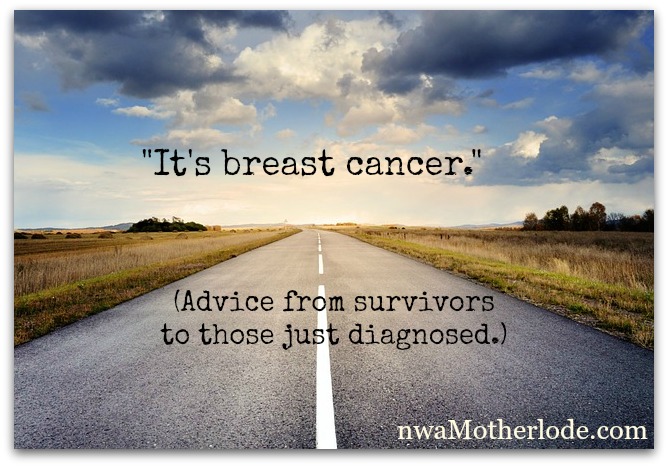This week on on our Mamas on Magic show we’re focusing on breast cancer since October is Breast Cancer Awareness Month.
This morning on the show, we shared some advice from local women about what to do when you’re first diagnosed with breast cancer. Since we weren’t able to share ALL the advice on the show (the segments are only 90 seconds), we thought we’d share in a post since this information is SO IMPORTANT.
So, what should you do if your doctor says, “It’s breast cancer”:
Gail:
Don’t panic (even though you probably will a little).
Progress even just since I was diagnosed 8 years ago, has been HUGE.
Also best thing told to me but took a while to sink in is that “EVERYBODY’S STORY IS NOT YOUR OWN”
You will hear countless stories of a friend’s mom or another’s aunt; some of these may make you ask yourself: why aren’t I getting that type of chemo, why didn’t I get a port, why did she have radiation and I didn’t? These things caused me a lot of stress until I realized just how individual each person’s situation is. You just don’t realize that until you are diagnosed. We tend to lump (no pun intended) all breast cancer together as one thing. In fact treatment is getting much more individualized to each person’s cancer and what makes their cancer tick. That can be vastly different between persons. You will have your own story, but always ask the doc questions if you are concerned, there are no dumb questions if it gives you peace of mind.
Also my greatest anxiety was leading up to chemo; it was the unknown: what will it be like, how sick will it make me.
For me and most people I know, it was not anywhere close to what we ourselves imagine. The drugs for anti nausea have gotten so very good.
Once you are in there and see all the other people going through various types of cancer: you realize, I got this!
 I’ll also add that exercise is very helpful to maintain physical and emotional health. Don’t put pressure on yourself to take up new exercise routine during treatment but at least get out for walks and be active those weeks you are feeling better.
I’ll also add that exercise is very helpful to maintain physical and emotional health. Don’t put pressure on yourself to take up new exercise routine during treatment but at least get out for walks and be active those weeks you are feeling better.
The first week after a treatment I rested but then weeks two and three I was back at the gym continuing with my Body Pump classes. I would take off my scarf when I got sweaty and didn’t care and nobody else did either except to tell me that I inspired them. After my surgery, I had nurses ask me if I worked out because my recovery was speedier as I was in good shape.
Accept help. This was very hard for me but Ill tell you what, having those frozen meals in my freezer that friends had provided was GREAT. Took me a while to get back in the routine of cooking again after everything was over. I got spoiled!
Eileen:
Ask your doctor about your decision-making timeline. Upon diagnosis, you will want to take care of everything immediately. You probably have time to let the news sink in, get second opinions, interview doctors and make a plan.
Get your support network in place. You will have lots of offers of help. Use them! Give people specific tasks or responsibilities. Maybe a friend to take the kids off your hands one evening a week or a male friend that wouldn’t mind taking your car for a wash and a vacuum. During surgeries and treatments, meal trains are awesome. Be realistic on what you will use…no one needs a fridge full of rotting leftovers.
Decide if you want to be everyone’s point of contact for updates. If not, select a good friend to update people on your behalf. Some people like to keep people posted through social media. That’s not for everyone. Caring Bridge offers a great platform to keep people posted. Let people know who they can reach out to for an update, if you don’t want that to be you.
Sit down with a well-seasoned associate in your HR department. Make sure you fully understand your benefits.
Start a binder. You’ll end up carrying it to all the appointments and the doctors and staff appreciate when you have things on hand (even though they should already have it). If you can pull out a copy of the pathology or your latest blood work, it makes the appointments go much more smoothly.
 Utilize the resources the doctors and organizations offer. Many of the groups have resources for cancer patients. Help with travel, bills, literature, support groups, counseling, massage, etc.
Utilize the resources the doctors and organizations offer. Many of the groups have resources for cancer patients. Help with travel, bills, literature, support groups, counseling, massage, etc.
Ask other survivors for help. They will gladly meet you for coffee and won’t hesitate to show you their scars, if that’s what you want. 😉
Talk to your significant other about how you want to talk to the kids about mom’s cancer. Be in agreement about the strategy and inform their caregivers. (We didn’t mention “cancer” in front of my four-year-old, because it is used in so many different ways and we didn’t want to scare her if it was taken out of context)
Be ready to manage your expectations. Things aren’t going to be the same. There is no way they can be.
Get counseling. You are going to have a lot to process and it is best to have a professional help you, your significant other and the kids through it.
Click here to read more about Eileen’s journey on her blog, Tall Boots and Big Girl Panties.
Nicole:
I’m three years out and going strong! I love to help others diagnosed so thanks for asking!
My advice to recently diagnosed women is, to take the time you need to process the situation. Talk with women who have been through it. Reach out to area resources and get as much information as you can on your disease. Utilize local support groups and facilities. Knowledge is power! Ask questions and journal your thoughts, feelings and how different meds and treatments make you feel. If someone offers to help, take it! I had a hard time with that, and so many people wanted to help! So if somebody wants to bring you a meal or help with your kids, let them!
I was diagnosed at 34 with stage 3 breast cancer. Our kids were 3, 6 and 9 at the time of my diagnosis. My immediate thought was I am going to beat this for my kids. I had lost my mom to breast cancer when I was a teenager and I was determined to kick cancer’s butt and I did!
More backstory from Nicole: My mom was diagnosed with stage 4 inflammatory breast cancer at age 36. She died at age 40. There was not a lot of treatment options for her kind of cancer back in 1993.
I did not get the gene testing done until after my diagnosis. I am BRCA2 positive. I was diligent about doing self breast exams because of my mom. I found the “lump” which felt more like “grizzle” or a hardening than an actual round lump.
We were new to the area. We had moved here in June of 2011. It was March of 2012 when I found the lump. I did not have a gynecologist yet so I went to my family doctor. It became more “real” when the PA also felt it. She set me up to have a mammogram a few days later. I was pleased how everyone put a rush on my testing due to having my mom pass away at a young age. I had a mammogram and they asked me to stay and have a ultrasound. I didn’t have my husband go with me because I assumed I would not hear anything that day.
After the ultrasound they asked me to go and talk with the radiologist who informed me that he was concerned with what he saw both on my mammogram and the ultrasound and he wanted me to see a surgeon that day…..within the hour. I asked him if he thought it was cancer and he has said there was a good chance but that we needed to do some further testing.
SO…..after a lot tests we found out it had spread to the lymph nodes and I would require four months of chemo therapy, bilateral mastectomies, 6 1/2 weeks of radiation and a complete hysterectomy due to finding out I was a BRCA2 carrier. The works!!
It was quite a year but I am adjusting to my new “normal” and life is good. Somedays I think, “did that really happen?” Until I see my scars, but life is good! I go for checkups every 6 months now and yearly PET scans. I feel good and am living life to the fullest!
Terri:
 The best advice I could give and that I have passed along to many people diagnosed is to learn PATIENCE.
The best advice I could give and that I have passed along to many people diagnosed is to learn PATIENCE.
Nothing will move as quickly as you would like. Just because you are diagnosed with breast cancer doesn’t mean the surgery will be immediately. Tests to determine what type of cancer it is and how it will best respond to treatment take time.
If a patient needs genetic testing to help decide treatment and surgery options, that too takes weeks.
Each cancer is unique so doctors have to determine the best plan for individual patients which varies. It’s not a one size fits all approach; it’s much more strategic.
Bottom line … it can be weeks if not months before your surgery following diagnosis. And following surgery, it can be weeks before treatment begins. It’s a very long process. For instance, I have a friend who was diagnosed Sept. 25. She let me know the other day her surgery will most likely take place sometime in December. For me, my surgery was six weeks after my diagnosis and treatment didn’t begin until five weeks after my surgery.
So, learning and accepting the word “patience” is my number 1 tip.
Click here to read more about Terri’s story.
Shawnna, breast care navigator at Mercy:
Make sure you have contact information for your physician, their nurse and your navigator if your facility offers one. You are given a great deal of information and it is very overwhelming. We expect you to have questions and we know you will not remember everything we discussed.
Ask questions-be an advocate for yourself.
If you have a navigator ask them to attend appointments with you, if they do not do that routinely.
Have a friend or family member attend your appointments with you- and take notes for you. Two sets of ears are usually helpful.
Get a notebook and dedicate it to your breast cancer journey. Keep it with you and as questions come to you write them down so you can ask your healthcare team.
I would recommend journaling through the breast cancer journey. People who journal through difficult events tend to do better in survivorship.
Selectively utilize the internet. While the internet is an awesome tool, be selective in your website choices. Stick with reputable websites for instance komen.org, cancer.org, cancer.gov, mdanderson.org, just to name a few.

